| Bhishma | |
|---|---|
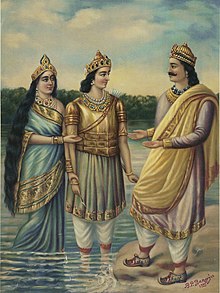
|
Contents
Birth
King Shantanu saw a beautiful woman on the banks of the river Ganges (Ganga) and asked her to marry him. She agreed but with one condition: that Shantanu would not ask any questions about her actions. They married and she later gave birth to a son. But she drowned the child. Shantanu could not ask her the reason, because of his promise, lest she would leave him. One by one, seven sons were born to them and were drowned by Ganga. When Ganga was about to drown the eighth son, Shantanu, devastated, could not restrain himself and confronted her. Finally, Ganga explained to King Shantanu about Brahma's curse given to Mahabhisha and her. Then she told him that their eight children were Eight Vasus who were cursed by Vasishtha to be born on earth as mortal humans however when they pacified him, he limited his curse and told them that they would be freed from this curse within a year of their birth as humans. So she released the seven of them from this life by drowning them all. However the eighth child Bhishma, was cursed to live a long life and to never have a wife or have children. But the sage also gave a boon to him that he would be virtuous, conversant with all the holy scriptures and will be an obedient son to his father. that she will take him to the heavens to train him properly for the King's throne and status. With these words she disappeared along with the child while Shantanu was struck with grief thinking about spending the rest of his life without her.
Shantanu stops Ganga from drowning their eighth child, who later was known as Bhishma.
After Devavrata was born, his mother Ganga took him to different realms, where he was brought up and trained by many eminent sages (Mahabharata Shanti Parva, section 38).
- Brihaspati: The son of Angiras and the preceptor of the Devas taught Devavrata the duties of kings (Dandaneeti), or political science and other Shastras.
- Shukracharya: The son of Bhrigu and the preceptor of the Asuras also taught Devavrata in political science and other branches of knowledge.
- Vashishtha, the Brahmarshi and Chyavana, the son of Bhrigu taught the Vedas and the Vedangas to Devavrata.
- Sanatkumara: The eldest son of Lord Brahma taught Devavrata the mental and spiritual sciences.
- Markandeya: The immortal son of Mrikandu of Bhrigu's race who acquired everlasting youth from Lord Shiva taught Devavrata in the duties of the Yatis.
- Parashurama: The son of Jamadagni of Bhrigu's race. Parashurama trained Bhishma in warfare.
- Indra: The king of the Devas. He bestowed celestial weapons on Bhishma.
Vow of Bhishma
Bhishma taking his bhishama pratigya
Having joined his father's court, Bhishma was easily confirmed as the heir apparent. Having undergone a successful military campaign, and being the child of a goddess himself, he was easily confirmed as the heir apparent and was loved by all in the city. Shantanu was proud of his son and content that the future was secure. However, Shantanu had slowly been falling in love with a fisherwoman, Satyavati, who operated the boats crossing one of Hastinapur's rivers. When Shantanu approached for her hand in marriage, Satyavati's father refused to give his daughter's hand to Shantanu unless Shantanu would proclaim her children as his heirs. However, doing so would be against the merit-based hereditary rules of Bharat, and Shantanu had already promised the throne to Bhishma. So, Shantanu sorrowfully had to reject the offer. This made Shantanu despondent, and upon discovering the reason for his father's despondency, Devavratha sought out the girl's father and ceded his claim to the throne. At this, Satyavati's father retorted that even if Devavratha gave up his claim to the throne, Devavratha's children would still claim the throne. Devavratha then took the vow of lifelong celibacy, thus sacrificing his 'crown-prince' title and denying himself the pleasures of conjugal love. This gave him immediate recognition among the gods. His father granted him the boon of Ichcha Mrityu (control over his own death — he could choose the time of his death, making him immortal till his chosen time of death). Criticism of King Shantanu from his subjects as to why he removed Bhishma from the title of the crown prince, as he was so capable, abounded. There was worry about the nobility of Shantanu's unborn children, now promised the throne. Hearing this, Bhishma said it was his decision and his father should not be blamed as Shantanu had never promised anything to Satyavati's father. The prime minister then asked who would be held responsible if the future crown prince isn't capable enough. Bhishma then took another vow that he would always see his father's image in whomever sat on the King's throne, and would thus serve him faithfully.
Years later, in the process of finding a bride for his half-brother, the young king Vichitravirya, Bhishma abducted princesses Amba, Ambika and Ambalika of Kashi from the assemblage of suitors at their swaymvara. Salwa, the ruler of Saubala, and Amba (the eldest princess) were in love; Salwa attempted to stop the abduction but was soundly beaten. Upon reaching Hastinapura, Amba confided in Bhishma that she wished to wed Salwa. Bhishma then sent her back to Salwa, who, bitter from his humiliating defeat at Bhishma's hands, turned her down. She retired to Vichitravirya who refused to accept citing the rules that what once given cannot be taken back. Disgraced, she approached Bhishma for marriage. He refused her, citing his oath. Enraged beyond measure, Amba vowed to avenge herself against Bhishma even if it meant being reborn over and over again.
Bhishma abducting princesses Amba, Ambika and Ambalika from the assemblage of suitors at their swayamvara.
In one version of the epic, on the 23rd day of battle, Bhishma attempted to use the Praswapastra against Parashurama. This weapon was not known to Parasurama and would put the afflicted to sleep in the battlefield. Before Bhishma could release it, however, a voice from the sky warned him that "if he uses this weapon it would be a great insult towards his Guru." Pitrs then appeared and obstructed the chariot of Parashurama, forbidding him from fighting any longer. At the behest of the divine sage Narada and the gods, Parashurama ended the conflict and the battle was declared a draw by Gods.
In another version, Parashurama himself stopped the fight after twenty-three days, worried that the further use of powerful weapons may lead to the destruction of the world.
Parashurama narrated the events to Amba and told her to seek Bhishma's protection. However, Amba refused to listen to Parashurama's advice and left angrily declaring that she would achieve her objective by asceticism. Her predicament unchanged, she did severe penance to please Shiva. Lord Shiva assured her that she would be born as a man named (Shikhandi) in her next birth (and still she would recall her past) and could be instrumental in Bhishma's death, thus satisfying her vow.
In The Kurukshetra War
Arjuna fight Bhishma
Duryodhana approached Bhishma one night and accused him of not fighting the battle to his full strength because of his affection for the Pandavas. The angry Bhishma took a vow that either he will kill Arjuna or will make Lord Krishna break his promise of not picking up any weapons during the war. On the next day there was an intense battle between Bhishma and Arjuna. Although Arjuna was very powerful, he was not fighting seriously and his heart was not in it to hurt Bhishma. Bhishma fired arrows such that Arjuna and Krishna were both injured. That angered Sri Krishna who took vow of not raising a weapon in the war, lifted a chariot wheel and threatened Bhishma. Arjuna stopped Lord Krishna. Arjuna convinced Krishna to return to the chariot and put down the wheel, promising to fight with all his might and stop Bhishma. Thus Bhishma fulfilled his vow and then Arjuna used stronger weapons making Bhishma also retreat.
The war was thus locked in a stalemate. As the Pandavas mulled over this situation, Krishna advised them to visit Bhishma himself and request him to suggest a way out of this stalemate. Bhishma loved the Pandavas and knew that he stood as an obstacle in their path to victory and so when they visited Bhishma, he gave them a hint as to how they could defeat him. He told them that if faced by one who had once been of the opposite gender, he would lay down his arms and fight no longer.
Later Krishna told Arjuna how he could bring down Bhishma, through the help of Shikhandi. The Pandavas were not agreeable to such a ploy, as by using such tactics they would not be following the path of Dharma, but Krishna suggested a clever alternative. And thus, on the next day, the tenth day of battle Shikhandi accompanied Arjuna on the latter's chariot and they faced Bhishma who did not fire arrows at Shikhandi. He was then felled in battle by Arjuna, pierced by innumerable arrows. With Sikhandhi in front Bhishma did not even look at that direction, Arjuna shot arrows at Bhishma, piercing his entire body. Thus, as was preordained (Mahadeva's boon to Amba that she would be the cause of Bhishma's death) Shikhandi, that is, Amba reincarnated was the cause of Bhishma's fall. As Bhishma fell, his whole body was held above the ground by the shafts of Arjuna's arrows which protruded from his back, and through his arms and legs. Seeing Bhishma lying on such a bed of arrows humbled even the gods who watched from the heavens in reverence. They silently blessed the mighty warrior. When the young princes of both armies gathered around him, inquiring if there was anything they could do, he told them that while his body lay on the bed of arrows above the ground, his head hung unsupported. Hearing this, many of the princes, both Kaurava and the Pandava alike brought him pillows of silk and velvet, but he refused them. He asked Arjuna to give him a pillow fit for a warrior. Arjuna then removed three arrows from his quiver and placed them underneath Bhishma's head, the pointed arrow tips facing upwards. To quench the war veteran's thirst, Arjuna shot an arrow into the earth, and a jet stream of water rose up and into Bhishma's mouth. It is said that Ganga herself rose to quench her son's thirst.
Death
Bhisma on arrows bed
Bhishma on bed of arrows depicted in Angkor Wat
Yudhishthira with Bhishma, from the Razm-namah, by Fattu, 1598
In popular culture
Films
His life has been made into many films in different Indian languages. The first silent film was made in 1922. During the talkie period, the first film was made in Hindi (1937). It was followed by a Bengali film in 1942 directed by Jyotish Bannerjee. Jahar Ganguli played the title role.In Telugu cinema, two films were made. The first film on Bhishma was made in 1944 directed by Chitrapu Narayana Rao. Jandhyala Gourinatha Sastry played the role of Bhishma. B. A. Subba Rao made a film in 1962 titled Bhishma. The title role was played by N. T. Rama Rao.
Bhishma's character was played by Mukesh Khanna in the B.R. Chopra's Mahabharat, one of the most successful Hindi television series. Aarav Chowdhary also played the role of Bhishma in Star Plus' Mahabharat. He is portrayed by Naved Aslam in Sony TV's Suryaputra Karn. Ronit Roy also portrayed it in Kahaani Hamaaray Mahaabhaarat Ki.
- Modern References
and Mahabharata by Gita press ,Gorakhour , and book by Ram Kumar bramer name : 18 days and others .
by : vipul Koul.sources given.
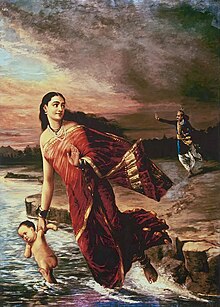
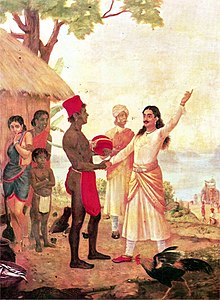


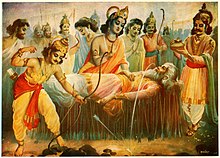

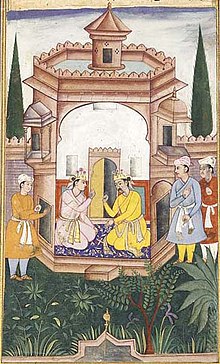

No comments:
Post a Comment